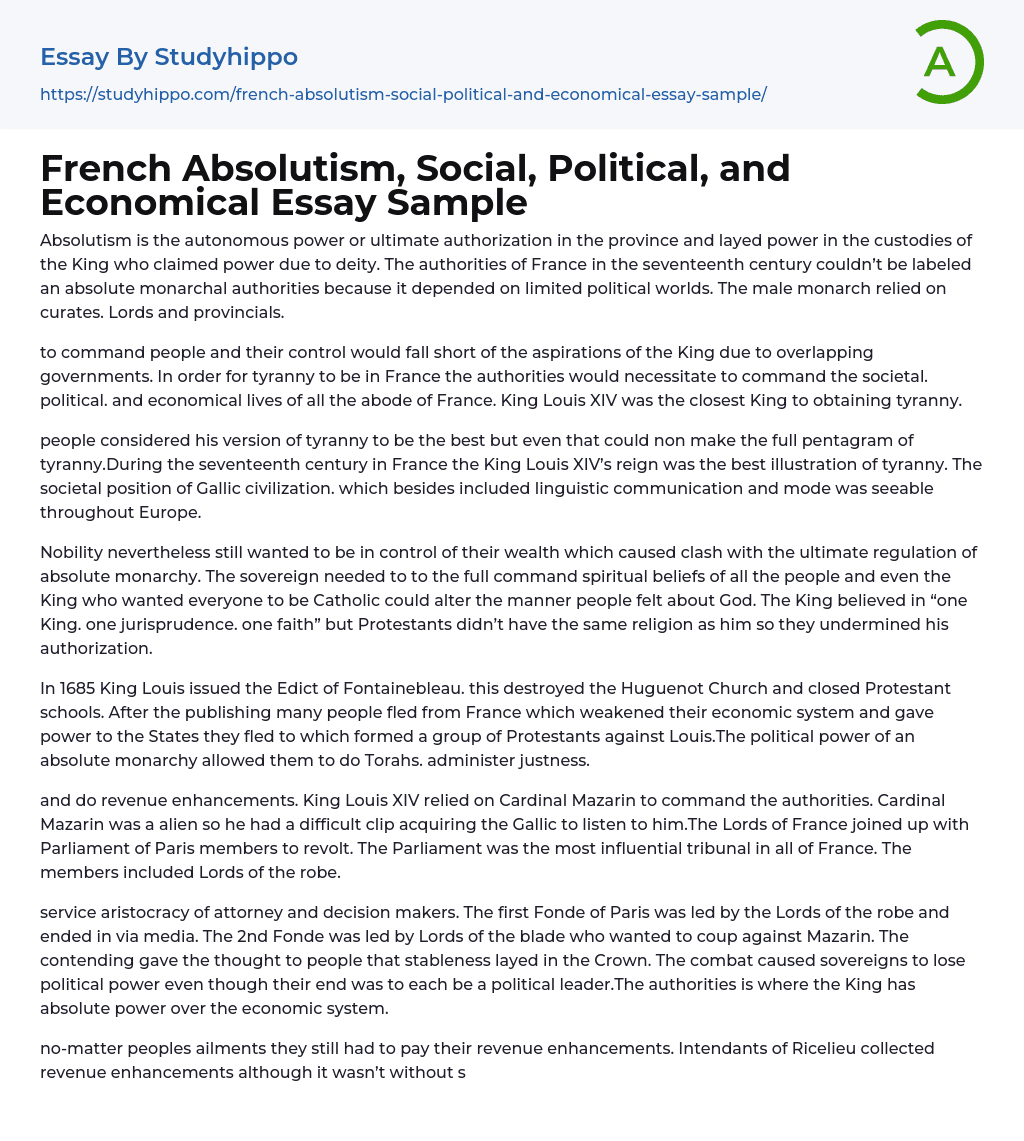

French Absolutism, Social, Political, and Economical Essay Sample
Absolutism is when the monarchy has autonomous power or ultimate authorization, usually justified as divine authority. However, in 17th century France, limited political factors such as curates, lords, and provincials prevented the government from being classified as an absolute monarchy.
King Louis XIV came close to achieving tyranny in France because of the need for authorities to control society, politics, and the economy, which was hindered by overlapping governments and fell short of the King's aspirations.
Although people deemed his form of tyranny superior, it failed to fully encompass the pentagram of tyranny. France's King Louis XIV exemplified tyranny during the seventeenth century, as evidenced by the widespread influence of French culture, including language and fashion, throughout Europe.
Conflicts arose among the nobility in absolute monarchy due to their desire to retain control over their
...wealth, despite the ultimate power of the sovereign. It was necessary for the king to fully regulate individuals' and even his own spiritual beliefs. While the king preferred everyone to follow Catholicism, he could influence people's beliefs about God. The principle of "one King, one law, one faith" was adhered to by the king but Protestants who did not share this religion undermined his authority.
King Louis issued the Edict of Fontainebleau in 1685, causing the destruction of the Huguenot Church and closure of Protestant schools. The aftermath resulted in the departure of numerous individuals, leading to a weakened economic system and the formation of a group of Protestants against Louis in the States where they sought refuge. The absolute monarchy had the political power to enact laws and administer justice.
During his reign, King Louis XIV implemented revenue-boosting measures and relied on Cardinal Mazarin
to lead the government. However, because Mazarin was a foreigner, he struggled to gain the trust of the French people. In fact, the Lords of France joined forces with members of the influential Paris Parliament to stage a revolt against him. These members included the powerful Lords of the Robe.
The aristocracy of attorneys and decision-makers in service was instrumental in the first Fonde of Paris, which was led by the Lords of the robe and eventually reached a compromise. However, the second Fonde was led by the Lords of the blade who attempted to stage a coup against Mazarin, ultimately leading to the belief among the people that stability lay in the Crown. Despite each sovereign's aim to become a political leader, the combat resulted in the loss of political power for them. The government is where the King wields absolute power over the economy.
Regardless of the medical conditions of individuals, they still had to pay their taxes. The Intendants of Richelieu were responsible for collecting taxes, which met resistance from other governors. Despite efforts by Cardinal Richelieu and Mazarin, there was still conflicting authority and each region had their own separate laws and courts.
Both aristocracy and provinces sought greater authority, with the former desiring control over large estates. Meanwhile, towns held onto their privileges and rights, often opposing the implementation of policies they disagreed with. This resulted in a diminished role for the King, as local officials actively hindered his exercise of absolute power.
During the seventeenth century, the King of France lacked complete control over the societal, economic, and political aspects of his country. When Louis attempted to regulate the spiritual beliefs of his
citizens, it caused a rebellion and resulted in economic decline.
Louis employed Cardinals as a means of ensuring authorization, but this resulted in the rise of positions such as Lords of the blade and robe. However, Louis was able to collect taxes successfully. Despite this, local governors and Lords challenged the King's authority. Louis XIV controlled policies related to Cardinals, which functioned as a means of government machinery and gave him control over monarchal districts. However, town councils limited the management of land.
Louis encountered opposition and hindrance from the aristocracy, functionaries, and estate representatives, preventing his tyranny according to Western Civilization Combined Volume Sixth Edition's bibliography.
Jackson J. Spielvogel
- Berlin essays
- Pompeii essays
- Paris essays
- Athens essays
- Belgium essays
- England essays
- Germany essays
- Greece essays
- Ireland essays
- Italy essays
- London essays
- Russia essays
- Spain essays
- United Kingdom essays
- Great britain essays
- Rome essays
- British essays
- Birmingham essays
- Absolutism essays
- Appeal essays
- Bourgeoisie essays
- Contras essays
- Corporate Governance essays
- Corruption essays
- Democracy essays
- Democratic Party essays
- Developed Country essays
- Dictatorship essays
- Elections essays
- European Union essays
- Federalism essays
- Foreign essays
- Foreign policy essays
- Gentrification essays
- Hillary Clinton essays
- Income Tax essays
- International Relations essays
- John Marshall essays
- John Stuart Mill essays
- Left-Wing Politics essays
- Liberty essays
- Military essays
- Monarch essays
- Monarchy essays
- Political Corruption essays
- Political Party essays
- Political Science essays
- President Of The United States essays
- Public Service essays
- Red Cross essays



